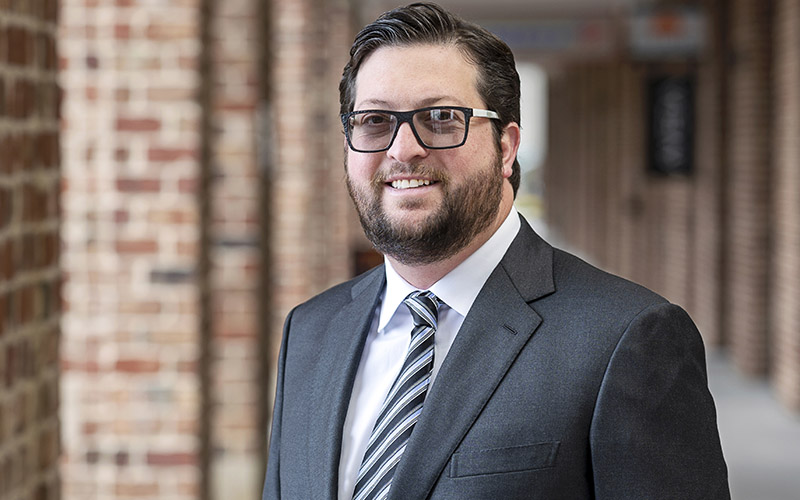Adding Value

Wilmington attorney Landon Zimmer embraces the challenge of developing land needing environmental cleanup through states’ brownfield programs.
“Typically, the harder it is to develop a site, the more value there is to unlock,” Zimmer said. “You know you’re doing a public good and benefit, and it’s a win-win.”
Zimmer is managing partner at Zimmer Development Co., a family-run business founded in 1989 in Wilmington. Infill and urban projects are among his priorities.
Zimmer earned an MBA from Duke University, where he also earned a law degree and an undergraduate degree. He is a partner at Zimmer and Zimmer and serves as a consultant for another family company, Reeds Jewelers.
He mainly is involved with the development company, which specializes in commercial and multifamily development and has about 30 employees, Zimmer said. The firm’s headquarters are expected to move from downtown Wilmington to Mayfaire, an area the company previously developed.
“I like working in the family business and hope to continue what the previous generations have started and continued,” he said.
Over the years, Zimmer’s firm has developed more than 260 projects in at least 140 cities, according to the company website.
Projects Landon Zimmer has helped lead include a mixed-use development in Tallahassee, Florida, that involves about 40 acres, in an old industrial area adjacent to Florida State University. Development started in 2015, and it was expected to be about a $400 million investment when completed in the next five years, Zimmer said. It will include student housing, retail, multifamily development and a hotel.
Construction is expected to start in May on a multifamily and retail development in Richmond, Virginia, estimated to be about a $250 million investment when completed in about five years, Zimmer said.
Cleaning up brownfield sites might involve removing contaminated soil and capping areas with barriers such as clean soil, Zimmer said. He estimated the company’s existing and future investment value of rehabilitated brownfields and infill development at more than $1 billion.
“A lot of the environmental benefit would be taking these contaminated properties and cleaning them up where previously people couldn’t utilize them,” Zimmer said. “Now you’ve got parks; you’ve got public space.”
Locally, Zimmer’s company has partnered with New Hanover County on Project Grace – the planned redevelopment of a 3-acre downtown Wilmington block along Grace Street to build a new Main Library and Cape Fear Museum, as well as private development.
Zimmer Development is working with architectural firm LS3P on Project Grace, and construction is expected to start this summer.
“We’ve just recently completed the design development drawings and sent those over to the museum and the library, and they’re working through comments now,” said Adam Tucker, director of development for the Zimmer company.
Design work includes using ballast stone and terra cotta as a nod to the Port City’s shipbuilding history.
Construction of the new library and museum was estimated to take about 18 to 24 months, said Jennifer Rigby, New Hanover County’s chief strategy officer, adding that the private development could take another 18 to 24 months.
The current Cape Fear Museum on Market Street will be transformed into a research and development division of the new museum, with archives and collections, Rigby said.
Main library services at the current Chestnut Street location will remain open during construction.
“The north side of the block will be constructed where the new library and the new museum will go; then the library can move over to the new facility, and then the existing library can be turned into private development,” Rigby said.
Construction of the new library and museum comes with a lease rate of $4.5 million per year for 20 years, Rigby said. While the cost is to taxpayers, Rigby noted there will be a new revenue stream from the private development.
“We believe this will be a cultural experience like none other,” Rigby said of the project. “Our hope is that it will really richly enhance the quality of life in New Hanover County.”
With his various projects, Landon Zimmer emphasized the importance of working with nearby cities and neighborhoods, even if it means having to change plans.
“The project has always benefited because at the end you’ve got a little more local flavor, you get local knowledge where we might be lacking,” Zimmer said. “That’s something we always try to do is incorporate a lot of local historic factors in any redevelopment, even if it is formerly industrial.”
Outside of the development company, Zimmer is chairman of the N.C. Department of Transportation’s technology committee, chairman of the N.C. Wildlife Resources Commission’s finance committee and vice chairman of the habitat, nongame and endangered species committee.
“I was an Eagle Scout growing up, always enjoyed the outdoors, hunting and fishing,” Zimmer said, later adding, “As a child you see loggerhead sea turtles … you learn about them, and their populations are dwindling.”
When asked if green space is a priority in development, he said that it’s a positive externality.
“People want areas to hang out, in apartments or multifamily areas –they want more green space, they want trails,” Zimmer said. “That’s something that people are really looking into – walkability.”
https://www.wilmingtonbiz.com/wilmingtonbiz_magazine/2022/03/24/adding_value/23009